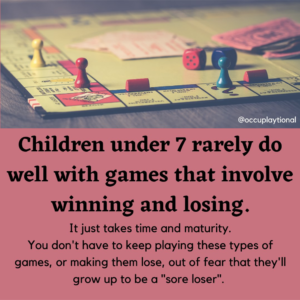
To speak in very general terms of averages — because that’s all I can talk about, is average child development, not your kid’s specific child development — 5-6 is when children start to really become aware of winning and losing, but they still can’t handle it well yet.
This is the age of racing ✨everywhere✨, of insisting that they win and you lose at everything. That sometimes leads parents to think that they’re ready for actual, structured winning and losing, but they’re usually not.
Children at around 5-6 love the concept of games, and they love making up their own game ideas. They might change the rules as the game is played, especially to cheat in order so that they will win. It’s not “real” cheating — it’s brain development, showing the start of understanding about what kinds of things lead to winning and losing! A much younger child can’t understand that kind of cause and effect or forward thinking yet.
No matter how often a child 5-6ish loses, no matter how often you tell them “It doesn’t matter if you win or lose, it’s fun to just play games,” that concept will not go through their head until they are developmentally ready (usually around 7; sometimes around 8-9 or later, depending on if they have other lagging social/emotional skills and what sort of context they’ve experienced winning and losing in).
Also, that’s straight-up a lie and you know it. 😉 It is not fun to lose. You might get to a point of maturity where you aren’t bothered by it, or aren’t feeling competitive, but nobody who *is* feeling emotionally invested and competitive is like “woohoo, I lose!” So honestly that’s kind of a silly thing to try to teach children. It can even be helpful to acknowledge, “Gosh, it sucks to lose sometimes, huh?” or “You know, the reason I don’t mind when you beat me is because I think it was fun that we played together!” or something a little more honest and a little less clichéd.
The great news is that there are loads of cooperative board games out there these days, which are often really fun for younger kids! Games with “no point” or no set end are often good for these ages too (think of things like “I Spy”, where you’re guessing what the other person is thinking but nobody wins or loses).
When children try to navigate winning and losing in their own made-up games with peers, try not to interject an adult’s lens on it. If they come to you for your help — “I won and she lost!” “Nuh-uh, he lost and I won!” — try to coach rather than refereeing. You don’t have to “make the call” about the end result. Talk the kids through sorting out their own social back-and-forth, however that ends up looking.
Really, you could also black out all of the text in this entire post except for “You don’t have to… out of fear…” because parenting that way, ever, is not very helpful. If your child is 5 and adores structured board games, great. Play games with them. If your child is 9 and loathes win/lose situations, give them some space to be themselves. I know adults who feel anxious about competitive games and drilling down on things that make your kid feel bad inside are not a way to connect with them or “prepare them for adulthood” or all the excuses people give me for why they do things like this to their child. Keep modelling grace and healthy frustration in all walks of life, not just game playing, and give them space and time to mature.

